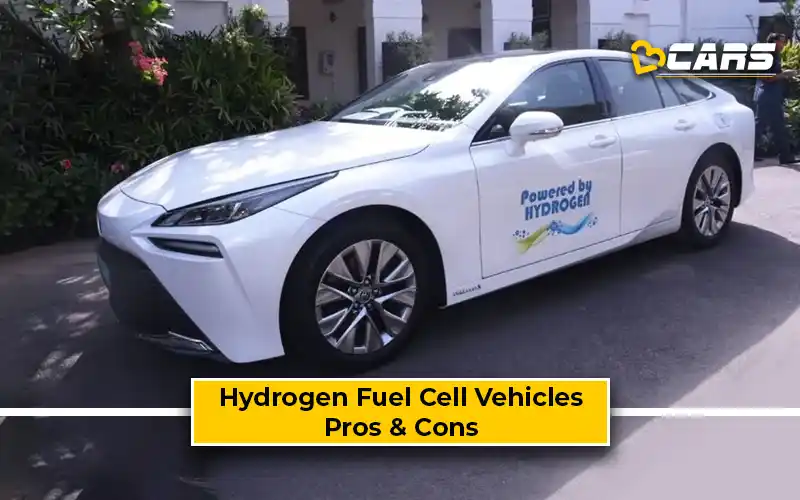Hydrogen Fuel Cell Vehicles - Pros And Cons | V3Cars
As you already know that the international community is pushing for alternative fuels to limit climate change and get a handle on pollution. Among the options the Indian government is considering are hydrogen fuel cell vehicles, EVs or electric cars and hydrogen fuel-cell vehicles of FCVs. in this article, we’ll briefly understand the workings of hydrogen fuel cell cars and then discuss the pros and cons of hydrogen fuel cell vehicles. With this information, you can decide if you should wait for hydrogen fuel cell vehicles or pick another type of alternative fuel car.

What Is A Hydrogen Fuel Cell Vehicle?
Hydrogen fuel-cell vehicles or FCVs use pressurised hydrogen to generate electricity from its reaction with oxygen in the air. This electricity partially goes into a battery pack. From there, the working is very similar to that of an electric vehicle.
If the car needs extra power, then the fuel-cell can also channel the electricity directly to the motor to extract some torque for a quick overtake. The pollution from the hydrogen-oxygen reaction is only water. So, essentially, no pollution. Refilling the hydrogen gas tank is as quick and easy as filling up CNG.
Also Read: 5 Reasons Why Electric Is NOT The Future - Hydrogen Is
What Are The Pros Or Advantages Of Hydrogen Fuel Cell Vehicles?
Following are the 5 major benefits of hydrogen fuel-cell vehicles.
1. Produces No Emissions During Running; Only Water — In Its Purest Form
The hydrogen-oxygen reaction produces H2O and energy. The energy goes towards moving the vehicle while the only tailpipe emissions are water. In fact, fuel-cell vehicles emit distilled water, which is water in its purest form. Even rain water absorbs minerals from the air by the time it reaches the surface. It’s worth noting that this is not suitable for drinking as our bodies need mineral-infused water.
2. Silent, Vibration-Free, EV-Like Driving Experience
While the hydrogen fuel-cell produces electricity, the driving also happens on electricity from the battery pack, fuel-cell or both. So, the driving experience is also just like an electric vehicle. It’s smooth, silent and vibration-free as even when the fuel-cell is running, it barely produces any noise or vibration.
3. Offers Driving Range Comparable With Petrol Cars
Since compressed hydrogen gas is more energy dense than Lithium batteries, we can store a lot of hydrogen in a small space. So, the hydrogen cars also manage to offer driving range similar to that of petrol cars without lugging around a heavy battery pack. Range anxiety is not a problem with hydrogen cars.
4. Quick & Easy To Refill Like A Petrol/Diesel Car
While hydrogen fuel stations are rare even in developed countries, at least filling up the hydrogen tank is easy. Being a gas, it’s also as easy to fill up the tank as that of a CNG vehicle.
5. High-Torque At Low RPMs Like Electric Vehicles
Just like electric cars, the hydrogen fuel-cell vehicles also have a lot of torque at very low RPMs. So, driving the car is very easy as they have good performance in the city and even at crawling speeds.
Check out list of Electric Cars in India
What Are The Cons Or Problems With Hydrogen Fuel Cell Vehicles?
Here are the 6 notable disadvantages of hydrogen fuel-cell vehicles.
1. Very High Infrastructure Cost For Production, Transportation, Storage & Distribution
Did you know that hydrogen is the most abundant element in the universe? Still, producing hydrogen is a challenging task as it’s not easily available in pure form because of its tendency to react to other elements.
Moreover, transportation, storage and distribution is another challenge. It’s obviously more difficult handling liquid fuels like petrol and diesel.
But, we’ve also figured out how to handle LPG and CNG!
Firstly, LPG is a lot easier to manage as it liquifies at relatively low pressures. Meanwhile, we store and transport CNG in gaseous form. Secondly, even among all gases, hydrogen is literally the lightest. It’s literally the first element in the periodic table and it takes up a lot of space or pressure to efficiently store hydrogen.
Large-scale production, transportation, storage and distribution of hydrogen will require a huge financial investment before it can start making financial sense for the average car buyer to even consider a hydrogen car.
2. Could Cause More Pollution If Produced Using Fossil Fuels Like Coal
Producing hydrogen requires electricity. That electricity can come from a thermal power plant running on coal, a nuclear power station or a solar farm. Depending on the source of electricity used in the process, the hydrogen gets several colour codes. Black or brown, for example, is for hydrogen made using fossil fuels. Pink is for nuclear hydrogen. Green is for hydrogen made from renewable sources of electricity. So, as an environmentally-conscious person, buying a hydrogen fuel-cell vehicle is not enough to save the planet.
3. It’s A New Technology And May Not Be As Reliable As Petrol/Diesel Cars
We’ve been running internal combustion engines for over a century. This is the reason why your petrol/diesel car doesn’t break down badly enough to leave you stranded even once during entire ownership. Hydrogen fuel cell vehicles are new. Refining the technology will take at least a decade, if not a century, after the mass market adoption kicks off. So,you should expect problems in the car during the ownership; even ones the carmaker never imagined. This process is normal for any new technology. Are you ready to go through this unpredictability to become an early adopter of the tech?
4. Repairs & Maintenance Are Complex And Long-Term Ownership Costs Are Unknown
Being a new piece of tech, the long-term ownership costs and repair and maintenance expenses are unknown. Unlike petrol and diesel cars, you can’t even expect a road-side mechanic to help you out. So, you have to completely rely on the manufacturer and their potentially monopolistic pricing of spares and labour.
5. Allows Governments Control Over Production, Distribution, Supply, And Thus, Taxation
Just like petrol, diesel and CNG, the production and distribution of hydrogen is out of the hands of an average company. The upfront costs and the unpredictable future of the fuel alone will keep most companies out of the race. So, if the government will control the supply side of hydrogen, they can control the taxation. This way, they can continue to tax hydrogen like sin goods — the way we’re paying for petrol and diesel today.
6. Ownership & Running Costs Depends On H2 Production & FCV Adoption
The governments around the world can subsidise hydrogen production and usage or tax it heavily. We can’t say for sure what the future holds for us. We can’t even estimate how the supply and demand sides of the equation are going to look like 5, 10, 20 or 50 years from now. Even if the production, transportation and distribution of hydrogen is streamlined, you can’t reliably predict the cost of the fuel in the long term.


0 Comments